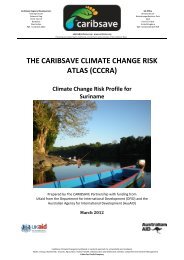You also want an ePaper? Increase the reach of your titles
YUMPU automatically turns print PDFs into web optimized ePapers that Google loves.
1. GLOBAL AND REGIONAL CONTEXT<br />
The Intergovernmental Panel on Climate Change (IPCC) Fourth Assessment Report (AR4), published in 2007,<br />
provides undisputable evidence that human activities are the major reason for the rise in greenhouse gas<br />
emissions <strong>and</strong> changes in the global climate system (IPCC, Summary for Policymakers. , 2007a). Notably,<br />
climate change is ongoing, with “observational evidence from all continents <strong>and</strong> oceans … that many<br />
natural systems are being affected by regional climate changes, particularly temperature increases” (IPCC,<br />
2007b, p. 8). Observed <strong>and</strong> projected climate change will in turn affect socio-economic development<br />
(Global Humanitarian Forum, 2009; Stern, 2006) with some 300,000 deaths per year currently being<br />
attributed to climate change (Global Humanitarian Forum, 2009). Mitigation (to reduce the speed at which<br />
the global climate changes) as well as adaptation (to cope with changes that are inevitable) are thus of<br />
great importance (Parry, et al., 2009).<br />
The IPCC (IPCC, 2007a, p. 5) notes that “warming of the climate system is unequivocal, as it is now evident<br />
from observations of increases in global average air <strong>and</strong> ocean temperatures, widespread melting of snow<br />
<strong>and</strong> ice <strong>and</strong> rising global average sea level”. Climate change has started to affect many natural systems,<br />
including hydrological systems (increased runoff <strong>and</strong> earlier spring peak discharge, warming of lakes <strong>and</strong><br />
rivers affecting thermal structure <strong>and</strong> water quality), terrestrial ecosystems (earlier spring events including<br />
leaf-unfolding, bird migration <strong>and</strong> egg-laying, biodiversity decline, <strong>and</strong> pole ward <strong>and</strong> upward shifts in the<br />
ranges of plants <strong>and</strong> animal species), as well as marine systems (rising water temperatures, changes in ice<br />
cover, salinity, acidification, oxygen levels <strong>and</strong> circulation, affecting shifts in the ranges <strong>and</strong> changes of<br />
algae, plankton <strong>and</strong> fish abundance).<br />
The IPCC (IPCC, 2007b) also notes that small isl<strong>and</strong>s are particularly vulnerable to the effects of climate<br />
change, including sea-level rise <strong>and</strong> extreme events. Deterioration in coastal conditions is expected to<br />
affect fisheries <strong>and</strong> tourism, with sea-level rise being “expected to exacerbate inundation, storm surge,<br />
erosion <strong>and</strong> other coastal hazards, threatening vital infrastructure, settlements <strong>and</strong> facilities that support<br />
the livelihood of isl<strong>and</strong> communities” (IPCC, 2007b, p. 15). Climate change is projected to reduce water<br />
resources in the Caribbean to a point where these become insufficient to meet dem<strong>and</strong>, at least in periods<br />
with low rainfalls (IPCC, 2007b). Together, these changes are projected to severely affect socio-economic<br />
development <strong>and</strong> well-being in the world (Stern, 2006), with the number of climate change related deaths<br />
expected to rise to 500,000 per year globally by 2020 (Global Humanitarian Forum, 2009). However, not all<br />
regions are equally vulnerable to climate change. The Caribbean needs to be seen as one of the most<br />
vulnerable regions, due to their relative affectedness by climate change, but also in terms of their capacity<br />
to adapt (Bueno, Herzfeld, Stanton, & Ackerman, 2008). This should be seen in the light of (Dulal, Shah, &<br />
Ahmad, 2009, p. 371) conclusion that:<br />
If the Caribbean countries fail to adapt, they are likely to take direct <strong>and</strong> substantial<br />
economic hits to their most important industry sectors such as tourism, which depends<br />
on the attractiveness of their natural coastal environments, <strong>and</strong> agriculture (including<br />
fisheries), which are highly climate sensitive sectors. By no incidence, these two sectors<br />
are the highest contributors to employment in the majority of these countries <strong>and</strong><br />
significant losses or economic downturn attendant to inability to adapt to climate<br />
change will not increase unemployment but have potentially debilitating social <strong>and</strong><br />
cultural consequences to communities.<br />
Climate change has, since the publication of the Intergovernmental Panel on Climate Change’s 4 th<br />
Assessment Report (IPCC, 2007b), been high on the global political agenda. The most recent UN Conference<br />
1





